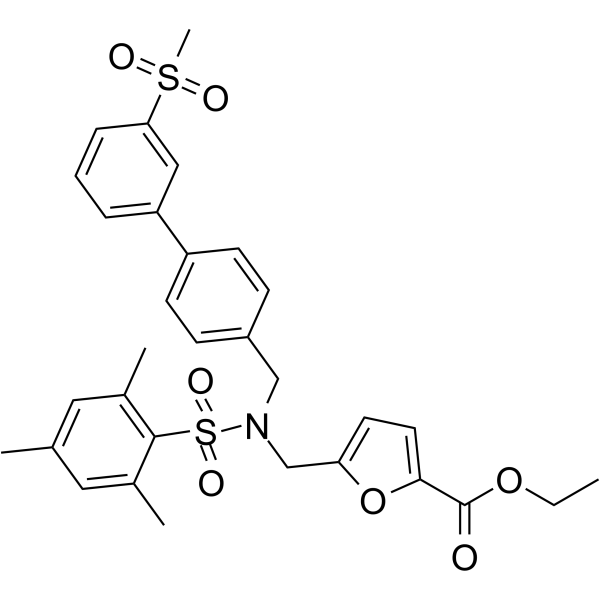
SR9238
CAS No. 1416153-62-2
SR9238( —— )
Catalog No. M26825 CAS No. 1416153-62-2
SR9238 is a synthetic agonist of liver X receptor inverse (IC50s: 214 nM and 43 nM for LXRα and LXRβ, respectively).
Purity : >98% (HPLC)
 COA
COA
 Datasheet
Datasheet
 HNMR
HNMR
 HPLC
HPLC
 MSDS
MSDS
 Handing Instructions
Handing Instructions
| Size | Price / USD | Stock | Quantity |
| 2MG | 37 | In Stock |


|
| 5MG | 60 | In Stock |


|
| 10MG | 105 | In Stock |


|
| 25MG | 213 | In Stock |


|
| 50MG | 375 | In Stock |


|
| 100MG | Get Quote | In Stock |


|
| 200MG | Get Quote | In Stock |


|
| 500MG | Get Quote | In Stock |


|
| 1G | Get Quote | In Stock |


|
Biological Information
-
Product NameSR9238
-
NoteResearch use only, not for human use.
-
Brief DescriptionSR9238 is a synthetic agonist of liver X receptor inverse (IC50s: 214 nM and 43 nM for LXRα and LXRβ, respectively).
-
DescriptionSR9238 is a synthetic agonist of liver X receptor inverse (IC50s: 214 nM and 43 nM for LXRα and LXRβ, respectively).(In Vitro):SR9238 effectively suppresses transcription from a fatty acid synthase promoter-driven luciferase reporter. SR9238 is a synthetic LXR inverse agonist (IC50s: 214 nM and 43 nM for LXRα and LXRβ, respectively). SR9238-induced recruitment of CoRNR box peptides is dose-dependent for both LXRα and LXRβ. It is found that SR9238 induces increased interaction of CoRNR box peptides derived from NCoR with both LXRα and LXRβ while causing decreased interaction with a coactivator NR box peptide derived from TRAP220. HepG2 cells treated with SR9238 cause a significant decrease in Fasn and Srebp1c mRNA expression.(In Vivo):SR9238 treatment inhibits diet-induced hepatosteatosis, hepatic inflammation, and hepatocellular injury. SR9238 is also detected in the intestine with either i.p. or oral administration. Approximately SR9238 (6 μM) is detected in the liver 2h after the injection of SR9238, but no compound is detected in the plasma. SR9238-treated mice show greatly reduced lipid content in the liver. Both Tnfa and Il1b expression are substantially reduced (~80% and >95%, respectively) in the SR9238-treated mice when compared to the vehicle-treated mice. SR9238-treated DIO mice display a considerably lower intensity of F4/80 staining versus vehicle-treated DIO mice consistent with a beneficial effect of SR9238 on non-alcoholic steatohepatitis. SR9238 treatment does not alter body weight or percent body fat composition relative to vehicle-treated animals during the experiment.
-
In VitroResults from the cell-based cotransfection assays demonstrate that SR9238 is a synthetic LXR inverse agonist with IC50s of 214 nM and 43 nM for LXRα and LXRβ, respectively. SR9238 also effectively suppresses transcription from afatty acid synthase (Fasn) promoter driven luciferase reporter. It is found that SR9238 induces increased interaction of CoRNR box peptides derived from NCoR (NCoR ID1 and NCoR ID2) with both LXRα and LXRβ, while causing decreased interaction with a coactivator NR box peptide derived from TRAP220.SR9238-induced recruitment of CoRNR box peptides is dose-dependent for both LXRα and LXRβ. HepG2 cells treated with SR9238 result in a significant decrease in Fasn and Srebp1c mRNA expression.
-
In VivoApproximately 6 μM SR9238 is detected in the liver 2h after the injection of SR9238, but no compound is detected in the plasma. SR9238 is also detected in the intestine with either ip or oral administration. SR9238-treated mice display greatly reduced lipid content in the liver. Results demonstrate that both Tnfa and Il1b expression are substantially reduced (~80% and >95%, respectively) in the SR9238-treated mice when compare to the vehicle-treated mice. SR9238-treated DIO mice display considerably lower intensity of F4/80 staining versus vehicle-treated DIO mice consistent with a beneficial effect of SR9238 on non-alcoholic steatohepatitis (NASH).SR9238 treatment does not alter body weight or percent body fat composition relative to vehicle treated animals during the experiment. Treatment with SR9238 suppresses diet-induced hepatosteatosis, hepatic inflammation, and hepatocellular injury.
-
Synonyms——
-
PathwayOthers
-
TargetOther Targets
-
RecptorNMDA receptor
-
Research Area——
-
Indication——
Chemical Information
-
CAS Number1416153-62-2
-
Formula Weight595.73
-
Molecular FormulaC31H33NO7S2
-
Purity>98% (HPLC)
-
SolubilityIn Vitro:?DMSO : 50 mg/mL (83.93 mM)
-
SMILESCCOC(=O)c1ccc(CN(Cc2ccc(cc2)-c2cccc(c2)S(C)(=O)=O)S(=O)(=O)c2c(C)cc(C)cc2C)o1
-
Chemical Name——
Shipping & Storage Information
-
Storage(-20℃)
-
ShippingWith Ice Pack
-
Stability≥ 2 years
Reference
1.Costa BM, et al. A novel family of negative and positive allosteric modulators of NMDA receptors. J Pharmacol Exp Ther. 2010 Dec;335(3):614-21.
molnova catalog



related products
-
Imazapic
Imazapic has a broad herbicidal spectrum and controls a variety of annual grass weeds.
-
D-Luciferin Sodium
D-Luciferin Sodium is a heterocyclic light-emitting compound and natural ligand for luciferase used to detect cell activity.
-
1-Hydroxy-2,3,4,7-te...
1-Hydroxy-2,3,4,7-tetramethoxy-xanthone has vasodilatory action, it can cause vasodilation in the coronary artery pre-contracted with 1uM 5-hydroxytryptamine (5-HT), with the EC 50 value of 6.6±1.4 uM.



 Cart
Cart
 sales@molnova.com
sales@molnova.com


